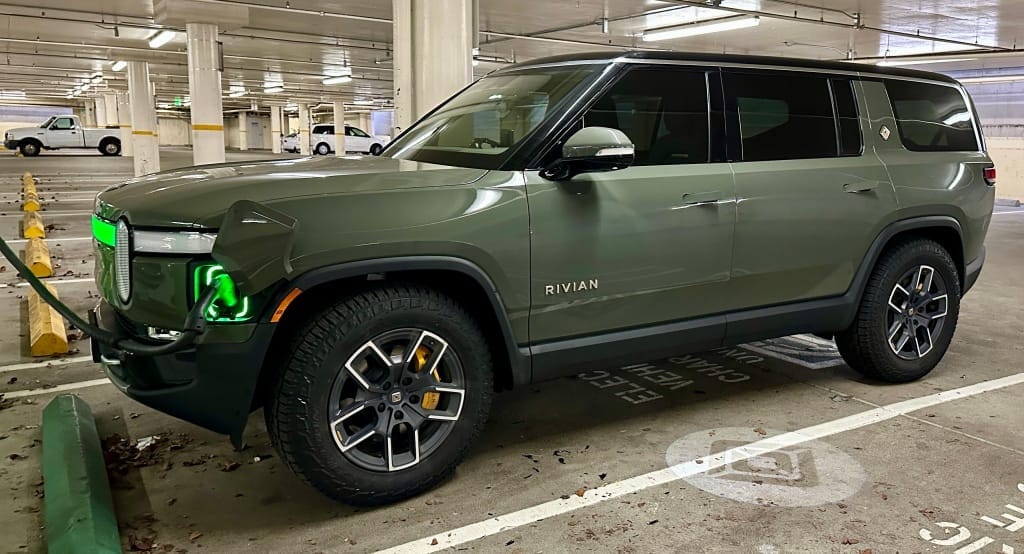Lessons from my first 1,300 mile road trip in an EV

I just returned from a 48hr jaunt to the San Francisco Bay Area, starting up near the Portland, Oregon area. I drove down in one day, and back the next day, on a route I've taken probably 50+ times over the last 20 years since I moved from there to here.
In a gas car, it's a pretty reliable trip that takes me anywhere from 10.5hrs to 11.5hrs, depending on how long I stick around. If I'm just refueling in between 3-4hr stretches, it's closer to 10 hours, if I sit down to have a meal anywhere, it's closer to 12 total.
I leased a EV in 2016 and taking any trip longer than 100 miles required a ton of research ahead of time. I'd have to plot my trip and search google and PlugShare for EV chargers along the way and download half a dozen apps to pay for them. This time out in 2023, I just put my destination in the nav screen in my driveway and trusted it to tell me how to travel there.
Some quick results upfront
My 650mi trip down to California took 12.5hrs and my return home was 13 hours. I started with the battery at 100% and drove it in its Eco Conserve mode the entire way. With a ~300mi battery, the nav screen usually forced me to stop every 150-200 miles, and it was more conservative around Mt. Shasta, where there's a lot of elevation gain to get over mountain passes and not a lot of huge cities with great EV charging infrastructure.
I had to recharge every 2 to 2.5hrs of driving around ~75mph, and each stop was usually about 30 minutes. I had no trouble finding fast chargers at almost every stop, and most stops were an Electrify America station outside of a Walmart. I don't usually shop at Walmarts but each stop I could buy something to eat and get some road trip essentials (like windex to clean the bugs off the windows). I also napped a few times during my charging downtimes.
In the end, I grew to like stopping more often than for gas. I needed the bathroom breaks and it made the whole trip feel relaxed at a more leisurely pace.
Teslas vs everything else
Tesla is miles ahead of every other EV maker because they've spent over 10 years building their own charger network. They control and own everything from soup to nuts, so when you plot a major roadtrip in a Tesla, it tells you where you should charge, how busy it will be when you get there, 3 top things to do around the charger, and even a bathroom code to unlock a Tesla-only washroom next to the chargers. That's pretty great, and Teslas also do a great job estimating your miles left accurately.
With every other EV company, it's kind of a crapshoot. It's a cart vs. horse problem where there are tons of EVs hitting the market now, but chargers are hodgepodge and run by a dozen different companies. The Rivian's nav screen would tell me where to charge, but couldn't tell me anything about the station beyond where I should stop. I had to look up each station in a charger's own company app to see how many were available, and which were super high wattage to make my charging time shorter. I used Google Maps to look for places to eat or shop during my downtime. It's a bummer the Rivian nav screen can't hit various APIs to tell me how busy a station was ahead of time or which specific charger I should look for.
Another major issue: the charging cables on high speed chargers are extremely short, making parking and charging a problem and in one case, I couldn't physically get my SUV parked at the right angle to attach to a short ~6ft cable, and I had to go a couple miles down the road to another charger instead. I also experienced the weird problem where a charging station with 4-6 chargers would only have 1-2 available because half of them were out of order.
Most charging stops charged me around 50 cents per kilowatt, so about $30-$40 each stop to top the battery up to 80%. A couple stops had free charging, like the one at the Oregon/California border's rest area. I was stopping for a quick bathroom break but got 10 extra miles in the few minutes it took for me to use the restrooms. The charging rates are fine, it's way cheaper than fuel these days plus I'm only rarely using a public charger, doing most of my charging at home, where electricity is only 5 cents a kW.
Google should make a Google Maps app for EVs
The difference between a Tesla nav and the Rivian nav around chargers and things to do near them was vast, and it reminded me that Google already knows everything it can about businesses, and they are good with remote APIs, so I bet a Google Maps app designed specifically for EVs would be a great new product. Tell me where to recharge, let me set my favorite brand of chargers in prefs, tell me how full the chargers currently are and what you predict they'll be like when I arrive, show me where to eat and give me links to menus on each option, show me which stores are nearby and show their hours since you know that already.
It seems like a no-brainer and a slam dunk for them. Heck, they could just bake these EV features into their existing Waze app they bought over 10 years ago and seemingly abandoned development on.
Range anxiety never goes away, but it's not that bad on new EVs
My 2016 EV only did about 75mi per full charge so range anxiety was in the front of my mind if I ever left my small town. With a 300 mile EV in 2023, I can run errands anywhere in the northwestern part of my state without any planning, and to date I've only charged at home on a 240v L2 home charger.
Road trips aren't that difficult, as the software is pretty good and as long as I followed its advice, I would never get stranded. The mileage estimates were conservative and it was rare I was below 50 miles left when I hit each suggested charger. Stopping every couple hours felt too soon at first, but I quickly got used to it and looked forward to each stop. I could definitely see why one guy I met at a charger was driving from Atlanta, Georgia to Seattle, WA nonstop. You get into a rhythm and all the driver aids make it a one-finger on the wheel kind of driving while listening to podcasts or audiobooks.
Honestly, driving an EV with auto-cruise control and lane keep assist starts to feel like a private train car whisking you from one city to another. A hundred years ago, getting your own Pullman train car to take you across the country required that you were a robber baron that exploited millions but now anyone with a nice EV can get that same feeling.
Now that I've got this long trip under my belt, I feel way better about public charging. I could see criss-crossing the state of Oregon and only being concerned in the most remote areas. As long as there are cities every couple hours, I'd be fine.
America is a very big, mostly empty country with its own specific problems, but I think EV infrastructure is getting to a pretty good place and I suspect in 5-10 years there will be EV chargers literally everywhere you stop, making EV travel easy and possible anywhere.
Subscribe to our newsletter.
Be the first to know - subscribe today





